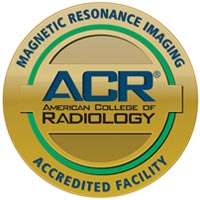Magnetic Resonance Imaging
 Magnetic resonance imaging (MRI) is a noninvasive imaging technique that works by creating a magnetic field and utilizes radio waves to generate high-resolution
detailed internal images of the human body. The images the MRI produces can also be 3 dimensional and can be viewed from many different angles.
Magnetic resonance imaging (MRI) is a noninvasive imaging technique that works by creating a magnetic field and utilizes radio waves to generate high-resolution
detailed internal images of the human body. The images the MRI produces can also be 3 dimensional and can be viewed from many different angles.
What to Expect During an MRI
Many MRI machines are large in the shape of circle where a patient is placed inside when the images are taken similar to a CT scan (LINK TO CT SCAN). When preparing for an MRI you lie down on a table that moves in and out of machine while the images are
being taken. During this process you are monitored by a technician in the other room. While the MRI is taking place, music can be played and you can speak to the technician in the other with a microphone. In the event you have a fear of enclosed areas,
medication may be administered to assist with anxiety you may feel. While this is a possibility, most people are able to undergo an MRI without any problem.
Depending on where the images need to take place, a contrast material may be injected through an intravenous (IV) line to help increase the clarity of the images. The contrast material is similar to those used for CT scans, but it is less likely to cause
an allergic reaction that some patients experience when receiving a CT scan
When the MRI begins, the internal portion of the machine creates repetitive noises as the machine is working to produce the magnetic field. If the noise is bothersome to you, music may be played and earplugs may be given to help block the noise.
The magnetic field that the MRI machine creates is strong and directs radio waves at your body which are harmless and painless. MRI’s can be as quick as 15 minutes or can go on for more than an hour. Your technician will ask that you stay as
still as you can during the process to prevent from having to retake the images.
Precautions When Getting an MRI
Since an MRI uses extremely powerful magnets to create images of the body, any metal in the area can cause for a huge safety concern as well as affect the images being taken. Before moving forward with the MRI, be sure to tell the technologist if you
have any electronic devices or metal in your body. Some examples of this many include any tattoos, implants such as a pacemaker or any plates and screws.
Prior to scheduling an MRI, discuss with your physician if you believe that you may be pregnant. Given that the effects of an MRI are unclear on an unborn child; your physician may recommend an alternative to the MRI. Also, if you have any kidney
or liver problems, these should be discussed with your physician given problems with these organs may affect the amount of contrast used for imaging.